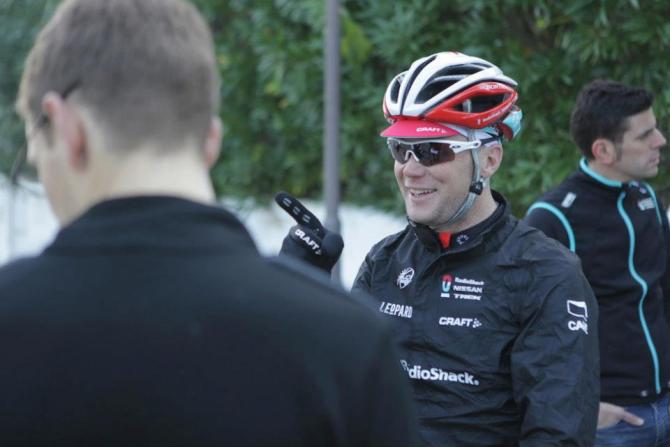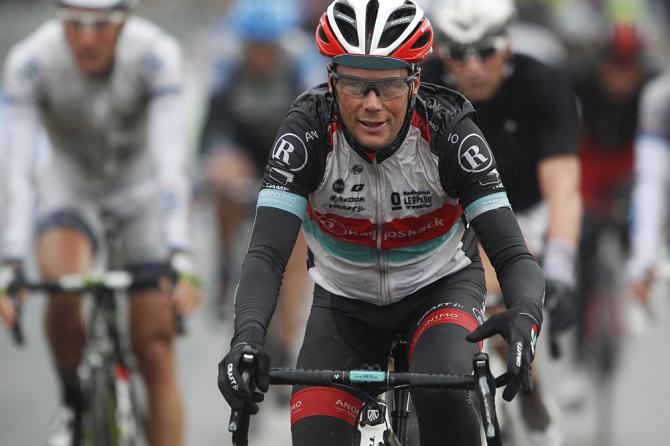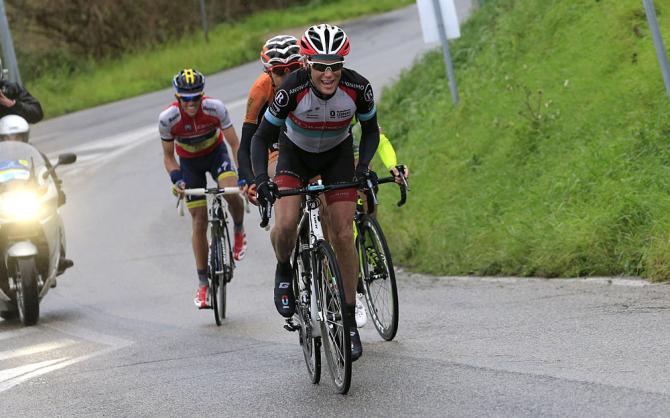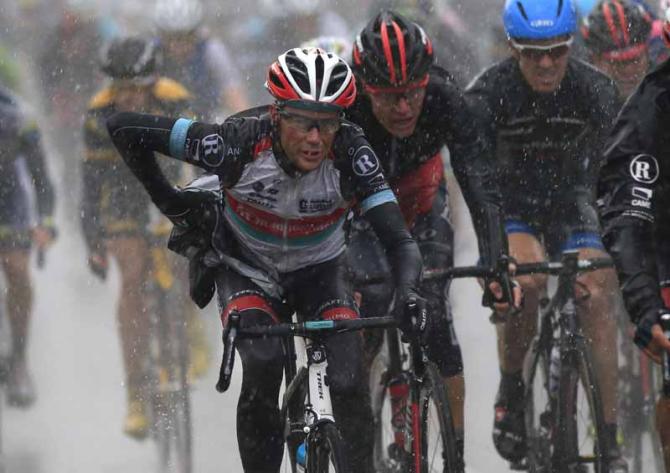Horner expecting to peak for Tour of California
American hit by iliotibial band friction syndrome




Despite having to withdraw from the Volta Ciclista a Catalunya and then skip the Vuelta al Pais Vasco because of a lingering knee injury, Chris Horner said this week that he expects to be fully recovered and in top condition when the Amgen Tour of California takes off on May 12 from very near his home in San Diego County.
Horner pulled out of Catalunya two weeks ago, revealing via Twitter that he had "tweaked something on the steep climbs in Tirreno." His RadioShack Leopard team said in a press release that he was suffering from iliotibial band friction syndrome.
"You have a big tendon on the outside of each leg and it attaches just below the knee," Horner told Cyclingnews. "There's some tissue underneath that band that protects it from the sharpness of the bone in the knee, and so that part gets irritated and inflamed. It's a strange injury that I've never had before. It's more common with runners than cyclists."
The injury can be especially frustrating, Horner said, because while the joint may appear to have healed - showing no outward signs of damage and not causing pain - the lack of symptoms can be deceptive. Too much strain on the tendon too early can quickly re-injure the joint and set the recovery back significantly.
"So it's a strange injury in general, and it's been difficult to deal with," Horner said. "Most injuries that I've had, when the pain is gone it's healed, but this one doesn't work that way. So it's very difficult for me as an athlete to understand when you can start training on it and when you can't."
An initial MRI taken in Europe revealed the injury before Horner returned to Bend, Oregon, to recover, and he hopes a second MRI on Friday will clear him to start training again next week. If he gets the 'ok' from his doctor, he'll drive from Oregon to San Diego, stopping along the way to preview some of the 2013 California stage routes. Horner said the eight-stage, UCI 2.HC race is the earliest he will return to racing.
"I've been off the bike for eight, nine, 10 days or something like that," Horner said Tuesday. "So even if it healed tomorrow, it's not like I'd have the form to go ride the classics or something. If it was 100 percent healed tomorrow by a miracle of God or something, which it won't be, but if it did then maybe I could make Romandie or something and then come back for California. But because I'm pretty certain it's not healed yet from what all the experts have told me, then it looks like California would be the best program."
Get The Leadout Newsletter
The latest race content, interviews, features, reviews and expert buying guides, direct to your inbox!
But can the 41-year-old American who won the race in 2011 regain the form he showed in the early season in time to compete for the win in California?
"If the knee is healed? Absolutely," Horner said. "That's no problem, I was almost 100 percent at Tirreno-Adriatico, and that was coming with the winter and Christmas and holidays, then flying to Europe for camp and flying back, so I basically had three good weeks of training and still was able to ride at Tirreno with good form."
Horner said he needs two weeks of moderate training, followed by a three-week block of "good" training to prepare for California. If his recovery allows that, he said, riding well at California should be "no problem."
"The weight is still very good," Horner said. "The morale is fine. I'm not upset or frustrated or sitting on the couch eating candy bars or anything like that. I need three good weeks. As long as the knee heals where I can start training good next week, then I'll be ready for California. There's a good window still, so no panic yet. If the knee problem lasted for another two or three weeks or something, then we might have a question mark about how I could ride there."
Horner said although the 2013 Tour of California route offers the advantage of starting so close to his Southern California home, the overall course doesn't look as difficult as when he won the overall in 2011. Nevertheless, the uphill finish for the Stage 6 time trial will favour his style much better than last year's flat time trial course in Bakersfield, where Horner slipped out of the overall battle with a poor showing.
"I don't know how difficult it is, it's hard to tell from the profiles," Horner said of this year's San Jose time trial course. "My wife has done a little research on it for me and stuff like that, and it looks like a pretty decent climb at the end. So anytime it goes up at the finish it's going to be a little bit better for me than if it's just a flat TT like you had in Bakersfield."
And although there has been much talk about the summit finish on Mt. Diablo, which comes on the penultimate stage, Horner believes the 124 mile Stage 2 trek from Murrieta to Greater Palm Springs could be even more decisive. The route climbs into the San Jacinto mountains before descending back into the valley below for the final climb up Tram Way. Horner said he has used the internet to research the climbs, as well as other people's power files and times.
"From what I've seen with Mt. Diablo, it doesn't look like it's extremely difficult," he said. "Certainly the finishing part is a little steeper than the beginning, from what I'm told, but it doesn't look like it's a [Mt.] Baldy by any means. So it could be that the race is more decided by the second stage and the time trial than even the Mt. Diablo stage."
After California, Horner will head back to the European circuit, where he expects his team to choose him for the Tour de France squad. The veteran rider said he doesn't believe this early season interruption will affect his chances to ride another Tour.
"I get on the scale, I show them my power files, and they can take an educated guess from there," he said of the team directors who will choose the Tour squad. "If anything, this will allow me to go in even fresher."
Horner said the unexpected time off the bike hasn't really changed his major goals for the season, although he'll have to work a little longer now to acquire the UCI points that make riders valuable to teams.
"In all honesty, I thought I would pick up 50 to 100 UCI points at Catalunya, and then I thought I'd pick up 50 to 100 points at the Basque Country," Horner said. "And so that would have made for a fantastic season just off of those three stage races, and it would have taken a lot of pressure off myself as a rider. Now I have to work with what I got from Tirreno and what I can get results-wise from California and through the Tour and stuff."
Growing up in Missoula, Montana, Pat competed in his first bike race in 1985 at Flathead Lake. He studied English and journalism at the University of Oregon and has covered North American cycling extensively since 2009, as well as racing and teams in Europe and South America. Pat currently lives in the US outside of Portland, Oregon, with his imaginary dog Rusty.